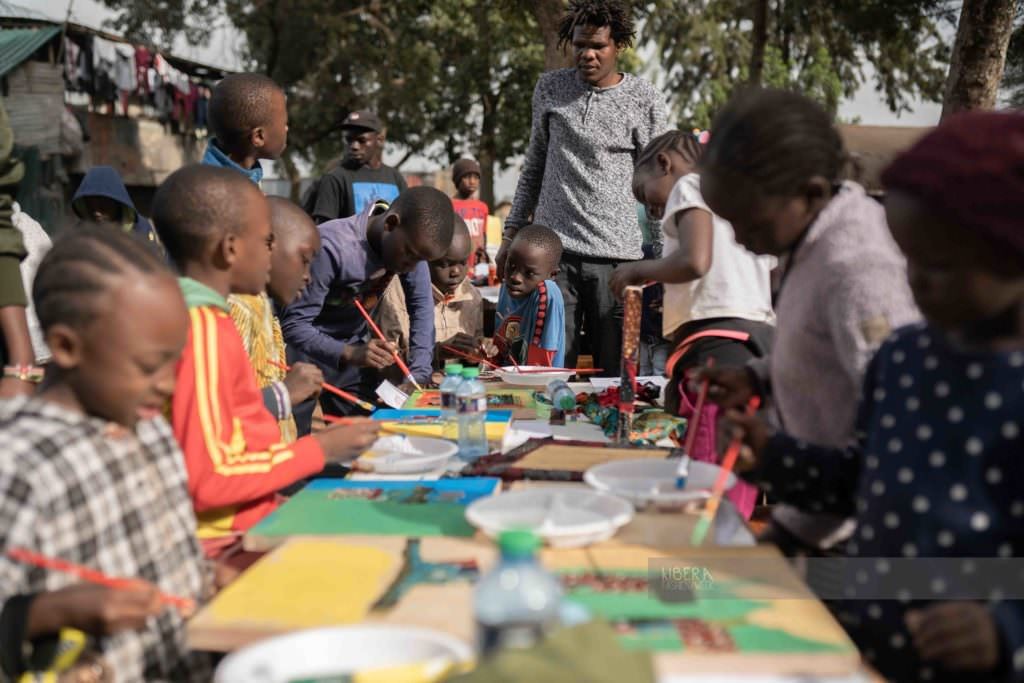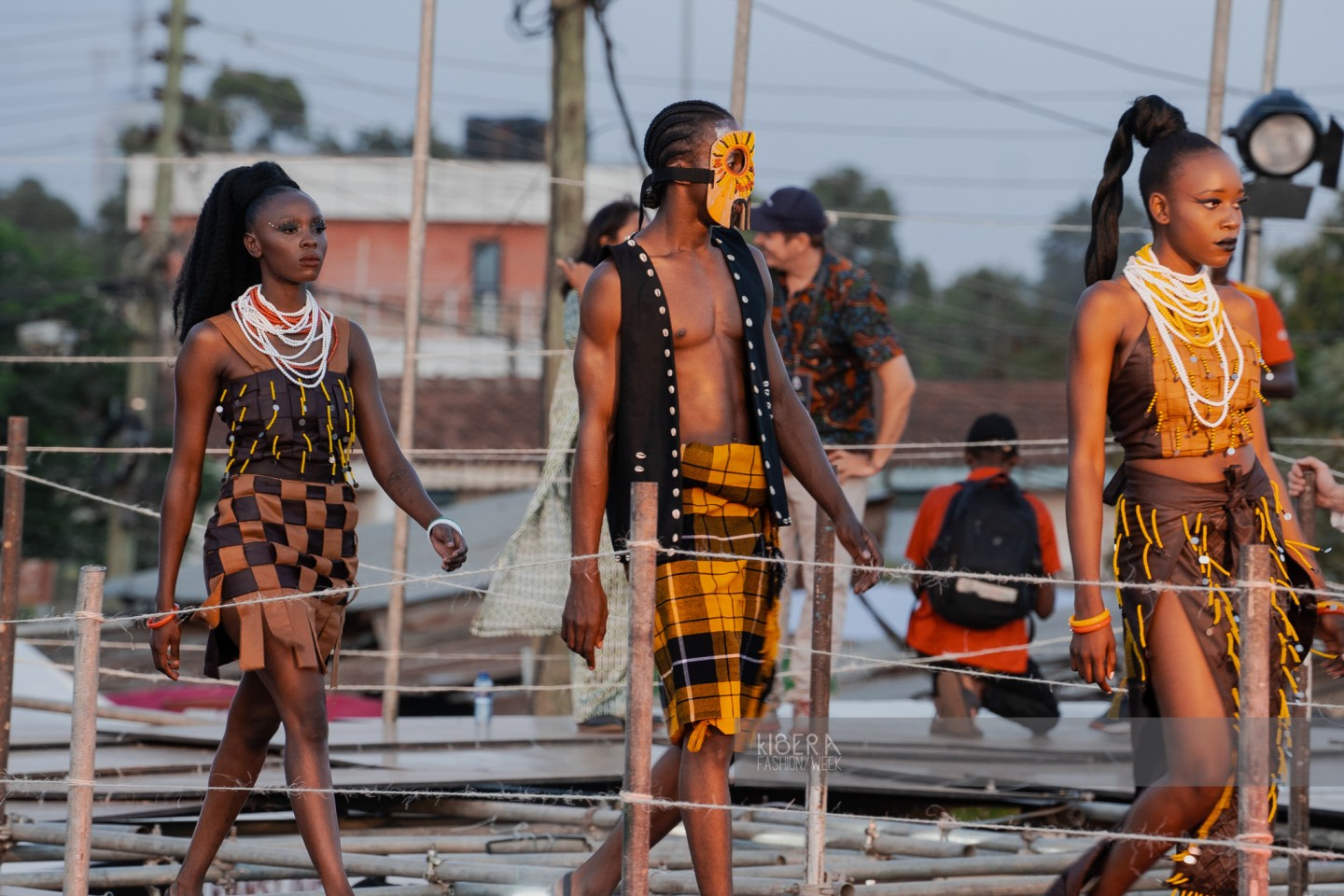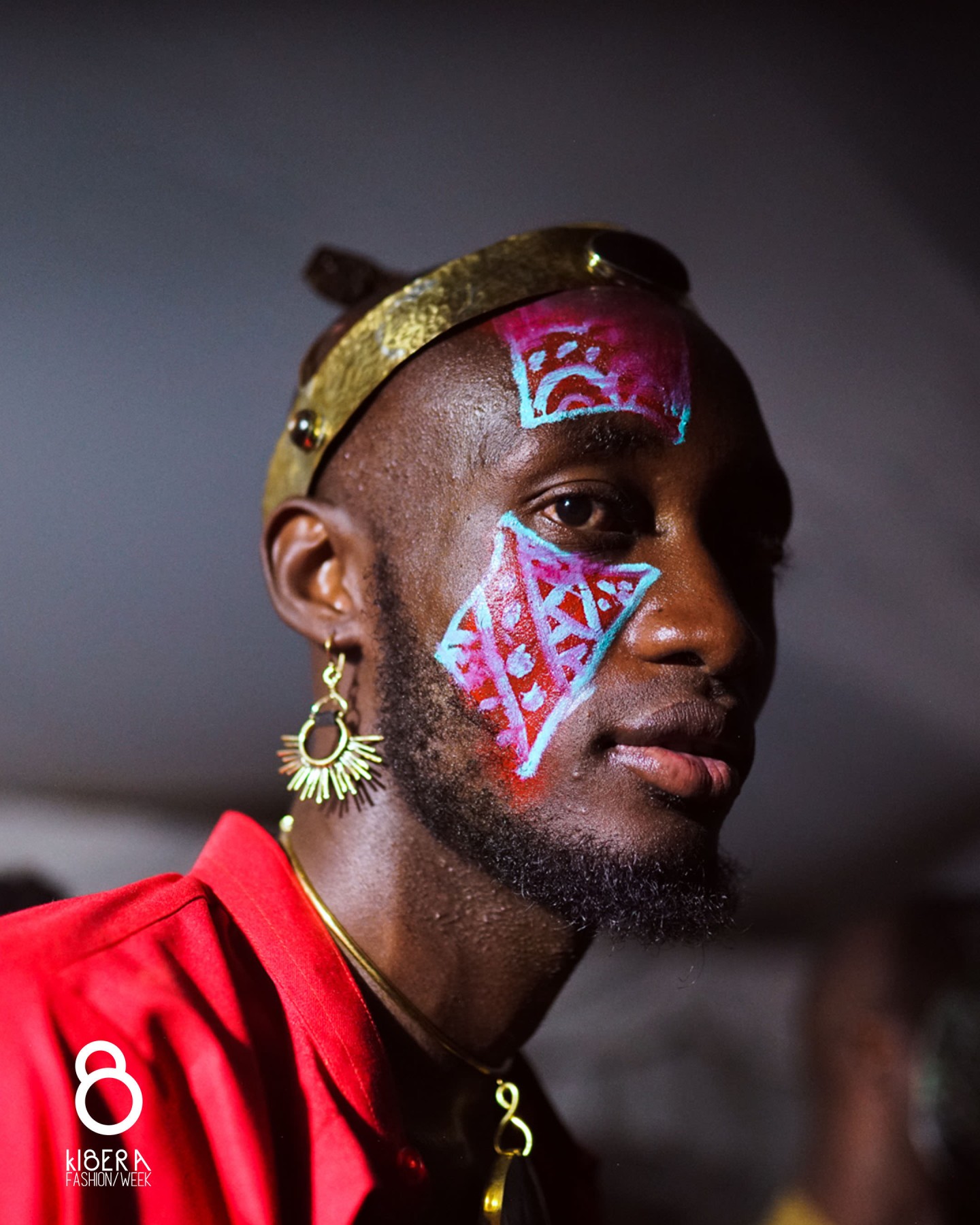Creative industries can be a tool for increased sustainability and local growth. Local creatives In Kenya, and especially in the Kibera settlement in Nairobi, however face several challenges in areas such as market access, sourcing, sharing skills and international reach. The Kibera Fashion Week has become a platform for the community to redefine fashion, share new methods for sustainability and bring together stakeholders from around the world to challenge unethical and exploitative consumption.
The Kibera Fashion Week is not your typical fashion week, but comprises a year-long programme to fundamentally change the power dynamics and narratives in the fashion industry, labelling itself a fashion week with the ambition to reinvent the format.
Showcasing the talent of creatives from Kibera and sharing their insights with audiences in Kenya and the EU, the project wants to build a new ethical and sustainable fashion industry. Rooting this project in Kibera confronts the neo-colonial realities of the fashion industry by learning from a community that is faced with the abundance of textile waste exported by European countries and creating a new dialogue around the consequences of unsustainable consumption. Through this dialogue a movement can start of change, impacting both consumers and designers in Kenya and abroad by respecting the skills and insights of local communities.
While Kibera is often portrayed as a place of hopelessness in need of help and so-called “development aid”, it is in fact a diverse metropolis, booming with creativity and constantly evolving and innovating. The project firmly believes that the world can learn a lot from the people of Kibera and that they possess the skills to become pioneers in a sustainable and ethical creative industry.
People back here normally see glamour on TV, but they don´t see it in their own streets. Not knowing that we have it back here. It´s just that we have not been able to acknowledge it in our own selves. The kids seeing a model walk in the streets, they are like ‘I want to be a model too’. Because they don´t just see that on TV now, but they can also relate with it in their own community.
David Avido, Founder of Looks Like Avido and project initiator
Changing the narrative
Instead of presenting Kibera as an area in need of aid, the project aims to show Kibera as a diverse and creative community. Also, Instead of inviting international experts "to teach", the project want to harness the skills and knowledge of the community. Kibera has brilliant creatives, we will create a space for them to share their knowledge. Instead of a hierarchical exchange, we want to have an exchange that goes both ways and encourages co-learning. Therefore, for every person the project invites from Europe, somebody will be sent back. Kibera is full of European experts – Europe also needs experts from Kibera.
Instead of defining sustainability as upcycling European second-hand clothes that are barely wearable, local perspectives need to be taken into account: combining local, sustainably sourced production with upcycling and a culture of repairing establishes a slow fashion approach that benefits the community and can be implemented worldwide, without exploitation. This elevates European collaboration by creating co-ownership of projects with local communities, utilising and respecting local talent and assets and considering collaboration as an opportunity for both sides. It also uses cultural collaboration as a powerful tool for societal change and economic growth, having impacts far beyond a traditional cultural project and creates a model that can be adapted for other communities.
Trialing the fashion showcase in Kibera
In November 2022 (still during the design phase of the project) the project team organised a trial for the fashion showcase in Kibera. Several local designers were invited to show their work on a catwalk on the East African railway line. The showcase, organised in the shortest span of time, reached wide participation with 30 creatives, designers and craftspeople directly involved and an audience of more than 500 present and got a strong media resonance, including mentions by BBC and other international news outlets.
Trialing the showcase proved the concept both regarding community ownership and logistics and security. It also led to direct increased visibility of Kibera designers and economic impact for the community through involvement in the production. For the project team, organising the showcase already at this stage of project development, helped develop a better understanding of target groups and audience impact, which further shaped the plan for 2023.
It's like a new vibe for Kibera, that is breaking boundaries within this vast community. It's providing hope and rethinking creativity beyond fashion, amplifying one's capabilites.
Kelvin Juma, videographer and photographer running the project Daily Life Kibera
Building on the success of the first edition of the project in November 2022, Kibera Fashion Week participated in Nairobi Design Week in March 2023 and organised several outreach activties in the area of Nairobi, aimed at sensitising consumers on sustainable consumption as well as promoting the local fashion industry, including film screenings, panel talks, and workshops. In an effort to cultivate creativity and inspire young minds, the project amongs other things held a transformative workshop facilitated by Maasai mbili catering to children aged 12 and under, as well as teenagers. The workshop aimed to foster creativity, enthusiasm for creativity, and ignite a sense of purpose and motivation among the young attendees.
After several months of preparation including a screening of their own film, panel talks and a kids workshop, the Kibera Fashion Week, a community-driven initiative, took place from 9 to 14 October 2023 to showcase the vibrant fashion scene in Kibera and leave a lasting impact on the city's fashion landscape.
Community-driven runway
The Kibera Fashion Week 2023, a community-driven initiative took place in the form of Kibera Fashion Week on 9-14 October in Kibera, a neighbourhood of the city of Nairobi in Kenya. The event was a grand showcase of local creativity and a think tank for sustainability involving and open to the entire community while reaching a global audience.
The week included visits to local studios, an exhibition, a panel talk and a film screening and ended with the main showcase of the week at the Olympic Bus Terminus in Kibera, with a fashion runway show and musical performances. The highly successful event is reflected in multiple news outlets covering the outcomes of the project, such as TV5 Monde, The Guardian, BBC, and taz.
The grand showcase included 15 designers' work, modeled by 20 models. Sustainability was not only visible in the over 100 garments presented, but engrained in the entire philosophy of the event. The designers emphasized sustainable and environentally friendly fabrics and locally-sourced materials for the designs, reducing the environmental impact associated with materials from far-off places. They also minimized textile waste through efficient patternmaking and creative reuse of materials. The ethics of sustainable fashion also extended to the production stage, ensuring fair labor conditions and equitable wages for workers involded in creating the garments.
The event served not only as a fashion show but also as an educational platform, sparking conversations about sustainability, inclusivity, and ethical fashion practices. By placing a strong emphasis on promoting local talent, including models, performers, and designers, the project contirbuted to nurtuting the growth of the local fashion industry in Kenya.
The collection is inspired by black people and just our melanin in its various shades. An appreciation of how beautiful our melanin is and how important it is. Youth as our audience take pride in who they are.
Joyleen Chepngetich, Designer of 'Melanin'
Open Studios
On 9 and 10 October, the project opened its studio doors in Kibera, for visitors to get to know the designers from Kibera in their own workspace. The 15 designers selected for the 2023 edition of Kibera Fashion Week are deeply immersed in the local community of Kibera, and over the last months of preparation came together for in-depth training emphasizing peer-to-peer learning and knowledge sharing. The design work places a strong emphasis on sustainability, ethical production practices, and inclusivity. Many of the designers are incorporating and portraying local issues for social justice in their design, such as youth empowerment, unemployment, queer identities and freedom of expression. Inspiration is drawn from local and traditional craftsmanship, tribal design, modern popculture, the queer ballroom scene, and more.
We as youths have big ideas and big plans but we never get the opportunities to bring them to life due to lack of employment and when one gets one, it’s never what you want to do hence no full potential is shown, lack of self-esteem and courage to go on. My collection simply shows the big ideas we have - pockets - that we never get the chance to show and it never get to be appreciated - the empty pockets.
Hellen wanjiru Njengam, Designer of 'Pocket Pennie’s swerve'
KFW Edition I Exhibition
From 11 to 15 October, the Goethe-Institut in Kenya held an exhibition, showcasing collections from the first edition of Kibera Fashion Week in 2022, as well as creative installations that have been happening throughout 2023. The exhibition was part of the project's effort to create a platform for nnovative fashion designers from East Africa to showcase their collections and celebrate a shared commitment to change. A notable aspect of the event was the strong focus on promoting sustainable design approaches, with designers demonstrating their dedication to environmentally friendly creations.
Sustainable Fashion Panel Talk
On 12 October, hosted by Alliance Française in Nairobi, the project organised a film screening of the previous edition of Kibera Fashion Week and a panel talk. Joined by project organisers and local fashion and sustainabilty experts, the panel addressed questions on sustainability and inclusivity, sustainable design practices, as well as potential business strategies for fashion entrepreneurs.
As creatives working together, we realized that there was a need to reflect on how the industry we were in impacted our environment.
Mariah Kwamboka, Designer of 'Bokka'
Sustainability of the project
The Kibera Fashion Week widely praised as one of the most innovative events of the year, it is clear that is has come to stay. Kibera Fashion Week has become a platform for the community to redefine fashion, share new methods for sustainability, and bring together stakeholders from around the world to challenge unethical and exploitative consumption. The project has created opportunities, built knowledge and skills within the community, while telling a different story about Kibera: it is a diverse neighbourhood, booming with creativity and constantly evolving and innovating.
The potential of raising funds, including from from corporate stakeholders would also be an important step, as investment from companies in cultural activities is very rare in Kenya and the project has been taking successful first steps in changing that. Beyond future activities, the project was always conceptualized to have a lasting impact. This was done by investing in skills and the establishment of networks throughout, as well as producing an extensive documentation and materials that can be used to support participants in a lasting way. This includes a project documentary and short videos covering every participating designer and continuing to build the website as an information platform that features information about all the showcased collections and partners. These outputs will be released over the next months and ensure continued visibility and a lasting platform for the participants.





